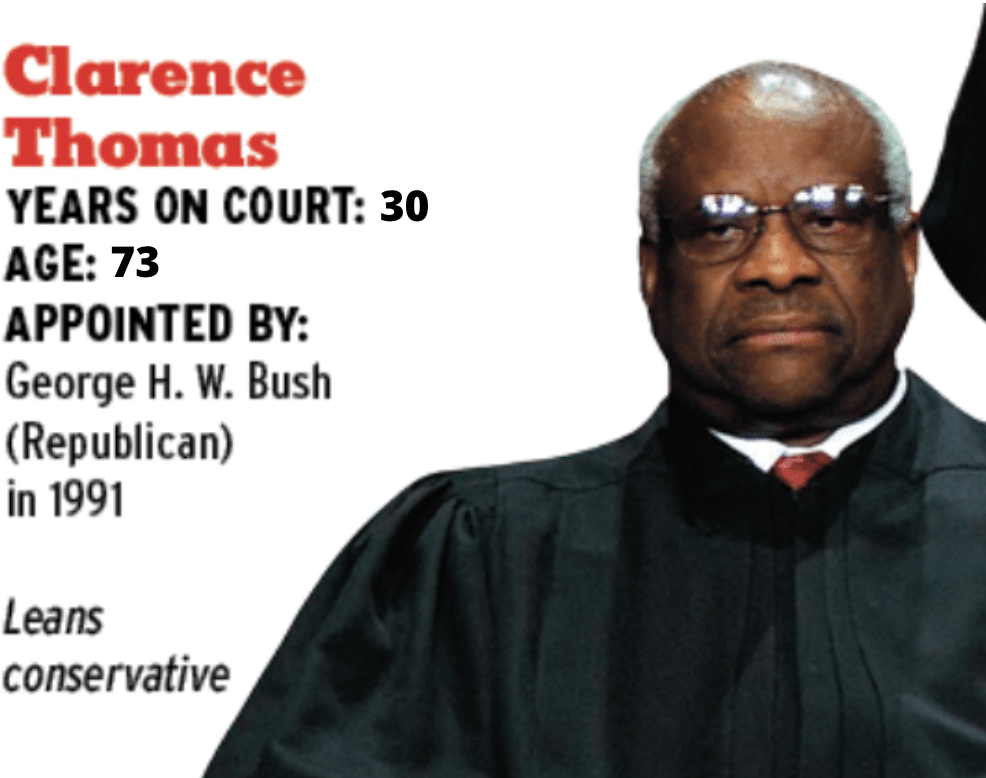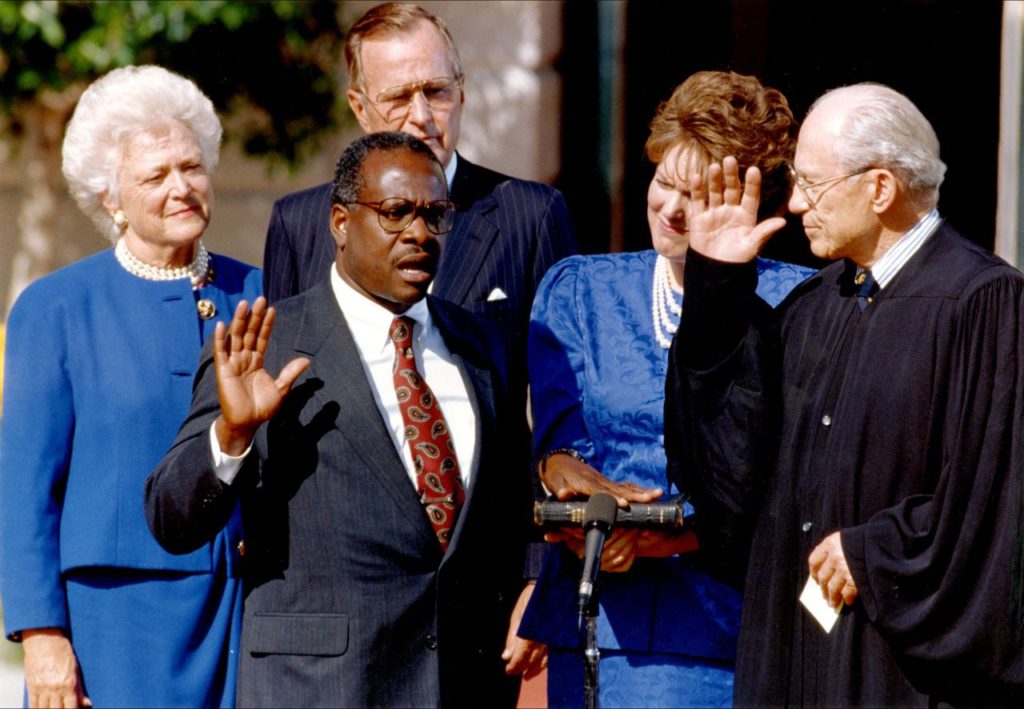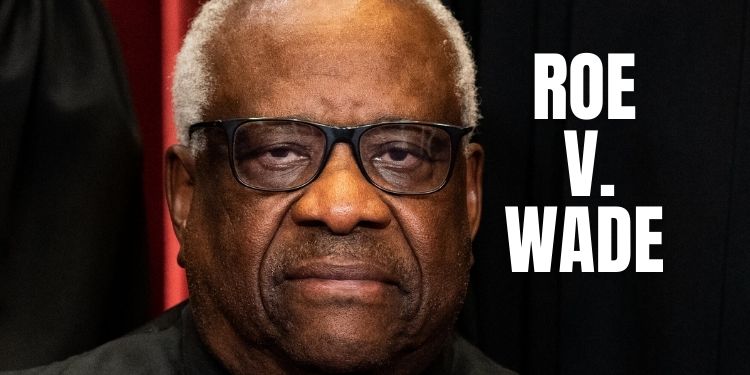SCOTUS to Hear Mississippi Abortion Case
Judge Clarence Thomas said at his Supreme Court confirmation hearings in 1991 that he hadn’t given that much thought to whether Roe v. Wade was correctly decided. Shortly after his confirmation, he concluded that the landmark 1973 ruling guaranteeing a woman’s right to abortion should be discarded. “The power of a woman to abort her unborn child” is not a liberty protected by the Constitution,” said a dissenting opinion from four members of the court, including Thomas. That was the start of three decades of official Thomas opposition to the notion of a constitutionally protected right to abortion.
This Wednesday Thomas and the most conservative Supreme Court in decades will consider a restrictive Mississippi abortion law that opponents and advocates alike agree is almost impossible to square with Roe and the precedents that have flowed from it. The 73-year-old Thomas, now the court’s longest-serving member has more justices who think like him than at any other point in his career. His seniority on the court means that he decides who writes the court’s opinion when he is in the majority and Chief Justice John Roberts Jr. is on the losing side. That is a bit more commonplace now as the court has grown more conservative. With five justices to his right, Roberts’s vote is no longer always key.

Thomas’s influence has quietly grown outside the courtroom as well. He has 125 former clerks –many of them held high-ranking positions in the Trump administration, including for a time the role of the administration’s top lawyer at the Supreme Court. Ten have lifetime appointments in the federal judiciary. Mississippi Solicitor General Scott Stewart, a former Thomas clerk, will be arguing the case for the state’s law, which prohibits almost all abortions after 15 weeks, months earlier than the court’s current abortion precedents allow. If the court reaches the question of whether Roe should be overturned, Stewart will not have to worry about at least one vote.
“Our abortion precedents are grievously wrong and should be overruled,” Thomas wrote in a dissenting opinion in 2020. The case concerned restrictions on abortion clinics and the doctors who perform the procedure, whom Thomas repeatedly referred to as “abortionists.”
“The Constitution does not constrain the States’ ability to regulate or even prohibit abortion,” he added.

Thomas was confirmed 52 – 48, the narrowest margin in more than a century. In October 1991, Americans were riveted by the spectacle of an all-white, all-male Senate Judiciary Committee questioning Anita Hill, the African American law professor who had accused Supreme Court nominee Clarence Thomas of sexual harassment. TV viewers, both male and female, watched in increasing discomfort as the senators asked Hill about large-breasted women, a porn star named Long Dong Silver and pubic hair on a Coke can, among other previously unthinkable subjects for a Senate committee hearing. But for women, Hill’s testimony would have special significance, as it was the first time someone had so publicly shared her account of workplace harassment—something that so many of them had experienced.
Both Thomas and Hill had risen from poor rural childhoods in segregated America, graduated from Yale Law School and launched promising legal careers in Washington, D.C. Their paths converged at the U.S. Department of Education in 1981, when Thomas hired Hill to be his special assistant in the department’s Office of Civil Rights. Shortly after that, according to Hill, Thomas began harassing her, a pattern that would continue after Thomas left his post to become chairman of the Equal Employment Opportunity Commission (EEOC), and Hill moved with him to continue as his assistant.
Hill, who left Washington in 1983 and became a law professor in her native Oklahoma, was initially reluctant to come forward with her allegations against Thomas. But in the late summer of 1991, she was contacted by members of the Senate Judiciary Committee who had heard rumors of possible misconduct by Thomas against at least one female employee in his past.
On October 11, Hill testified before the committee that Thomas had asked her out repeatedly and that even after she refused, often talked to her in graphic detail about sex. Throughout the brutally uncomfortable questioning by senators, Hill retained her composure, even when forced to repeat again and again the most disturbing and embarrassing parts of Thomas’ alleged harassment.
Thomas vehemently denied Hill’s allegations and invoked racial discrimination, calling the hearing “a national disgrace…a high-tech lynching for uppity Blacks who in any way deign to think for themselves.” imagining Thomas’ harassment, or of committing “flat-out perjury,” in the words of Senator Arlen Specter of Pennsylvania. Senator Orrin Hatch of Utah even accused her of borrowing the Coke can incident from the 1971 novel The Exorcist. Despite Hill’s testimony, and that of four corroborating witnesses who said she talked with them about Thomas’ behavior at the time, the Senate voted to confirm.
Clarence Thomas is a deeply troubled man – a grotesquely twisted, personality at war with the demons of his dark-skinned, dirt-poor youth. Although Thomas has accumulated many “enemies” – earned and imagined – since his entrance to the white world his core pathology is Black-directed – a trait so obvious it was immediately perceived by a succession of white Republican racists who rocketed him to the U.S. Supreme Court with obscene haste to become a hitman against his own people. The irony is for one who has benefitted from civil rights his entire career, Thomas’ disdain is legendary.
Thomas is a perverse right-wing joke played on Blacks and, it is a knowledge he cannot endure, a burden that has made him a pathological liar, who blurts out contradictions so antithetical to each other that they cannot possibly coexist in the same brain. Thomas claims to have assiduously avoided studying any civil rights cases at law school, and later urged students to do
the same. Thomas wanted nothing to do with “civil rights” of any kind – a permanent bent that rendered him singularly unqualified for the life-path that would begin right after graduation, when the enemies of civil rights took him under their wings and crafted him into a weapon against every vestige of the Black Freedom Movement.
His frankness in reflecting on his own position as a black conservative is, in retrospect, touched by irony. ‘If I ever went to work for the EEOC or did anything directly connected with blacks, my career would be irreparably ruined. The monkey would be on my back to prove that I didn’t have the job because I’m black. People meeting me for the first time would automatically dismiss my thinking as second-rate.'”
In May of 1981, despite his misgivings, he joined the Administration as the Department of Education’s assistant secretary for civil rights. Eight months after he began his job at the Department of Education, the President nominated him to head the EEOC.” In 1990, President George H. W. Bush appointed Thomas to the U.S. appellate court for the District of Columbia, where he remained for barely a year before Bush nominated him to the U.S. Supreme Court, in 1991.
In 12 short years, the man who said “civil rights” appointments were “career suicide” had been catapulted from an aide to Sen. Danforth to lifetime Associate Supreme Court Justice, without ever having tried a case as a lawyer or worked at a law firm.
Thomas has written over 300 High Court opinions, about par for the course. He has been a minority-of-one more often than any other Justice, simply because, despite being surrounded by clerks educated in the chapter-and-verse of precedent and statute, Thomas repeatedly casts the fundamentals of judgeship aside to vent his venom, hostility, pent-up pain, and desire for
vengeance – against his fellow African Americans. On Wednesday he will no longer be a minority of one as the most conservative court in decades ponder the fate of Roe v. Wade. This story is developing. For updates please visit www.saobserver.com.





